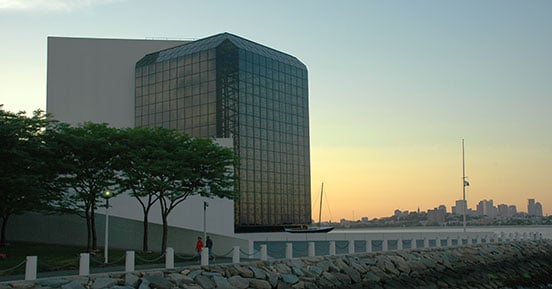Elevate the power of your work
Get a FREE consultation today!
The John F. Kennedy Presidential Library has enlisted Iron Mountain's help in its effort to build and operate a digital archive - the largest of its kind among presidential libraries.

The John F. Kennedy Presidential Library has enlisted Iron Mountain Media & Archive Services' help in its effort to build and operate a digital archive—the largest of its kind among presidential libraries. This major undertaking is perfectly aligned with Iron Mountain Media & Archive Services' mission to protect information and help organizations to better access and use it.
The John F. Kennedy Library Foundation’s goals were to provide worldwide accessibility to the collections of the John F. Kennedy Presidential Library via the Internet, to minimize wear and tear on these treasured and irreplaceable physical assets and to enhance the capability to search the collection using metadata. They enlisted ’s help to restore and digitize copies of video tapes and audio recordings as well as to provide a safe home for a backup copy of the digital archive files.
Prior to Iron Mountain Media & Archive Services' involvement, the John F. Kennedy Presidential Library, with help from the National Archives and Records Administration and EMC, had made steady progress toward its goals, but it needed additional resources to accomplish the monumental task at hand.
One of the bigger challenges facing the team was an inadequate IT infrastructure to support the project.
To overcome this issue, the Foundation relied on the technology and technical expertise of AT&T®, EMC, Iron Mountain Media & Archive Services and Raytheon®. These founding partners worked with the John F. Kennedy Presidential Library to build the Digital Archives and the technical infrastructure necessary to digitize, catalogue and store hundreds of thousands of precious historical assets.
Beginning with the top six priority collections of the Library, approximately 200,000 scanned pages of textual material, 300 audiotapes, 1,500 photographs and 72 film reels are now available via www.jfklibrary.org.
The first order of business for Iron Mountain Media & Archive Services was to securely transport copies of the Library’s video and audio collections to Iron Mountain Media & Archive Services' Underground, a high-security storage facility located 220 feet underground in a former limestone mine in Boyers, Pa.
While the Underground is a secure bunker for the storage of paper and digital information, it’s also used for digitizing highly sensitive records.
Upon arrival at the secure facility in Pennsylvania, the audio and video assets of the John F. Kennedy Presidential Library were “triaged” and sorted so engineers could assess their physical condition. Some reels had minor corrosion, and some tapes contained moisture and couldn’t be played. Many tapes and videos arrived in formats that aren’t used today. For example, the audio arrived in magnetic tape reels and an antiquated format called a metal master, ranging from 10-inch, 12-inch and 16-inch grooved discs.
The assets then went through a careful cleaning by hand. The discs were wiped with lint-free cloths and brushes, and the tapes were cleaned and re-tensioned, or tightened. The video arrived on video cassettes, magnetic tape reels and ¾-inch U-matic® tapes, a popular film choice for universities and libraries due to its low cost at the time. Some tapes that had been exposed to moisture needed to be “baked” to dehydrate them in order to be playable once again.
This hands-on process involved an engineer sitting with each asset:
Claus Trelby, who specializes in digitizing and migrating digital assets as managing engineer and partner with Iron Mountain Media & Archive Services' team, compares the work Iron Mountain Media & Archive Services engineers do to forensic science. He says that technology and software innovations certainly help the restoration and digitization process, but nothing can replace astute observations made with human eyes and the delicate touch of the human hand. “We work in a clean, structured environment, using the most modern digitizing equipment available. Our engineers are hands-on doing work that cannot be replicated by software. Very few other studios in the world can do this kind of work.”
In this phase of the project, 204 video tapes and 224 audio recordings were digitized.
The assets then went through a careful cleaning by hand. The discs were wiped with lint-free cloths and brushes, and the tapes were cleaned and re-tensioned, or tightened. The video arrived on video cassettes, magnetic tape reels and ¾-inch U-matic® tapes, a popular film choice for universities and libraries due to its low cost at the time. Some tapes that had been exposed to moisture needed to be “baked” to dehydrate them in order to be playable once again. This hands-on process involved an engineer sitting with each asset:
The restored video includes personal footage of family vacations at Camp David and Hyannis; earlier video of President Kennedy in his early 40s with his brothers, sisters and friends and footage from his wedding to Jackie. Official video includes Edward R. Murrow interviews, Nixon debates, and Inauguration and State of the Union coverage on CBS. There are White House films spanning the timeframe from his Inauguration to his funeral and official footage supplied by U.S. government agencies.
Audio assets include some of the most recognized speeches in America’s culture—including “Ask not what your country can do for you…” You’ll also be able to access phone calls, press conferences and State of the Union addresses. There’s also pre-presidential audio from Kennedy’s 1952 campaign for Congress and debates with Henry Cabot Lodge. Additionally, there are some speeches by the President’s father, Joseph P. Kennedy, Sr. from 1940, 1941 and 1945.
After the cleaning and digitization of the video and audio recordings, Iron Mountain Media & Archive Services was tasked with providing the JFK Library Foundation with two copies. For the audio recordings, one version was a digitally enhanced copy where the volume was optimized, and the engineers cleaned up what they call artifacts—or ticks, pops, crackles and hissing. The other copy was an original copy. For the video recordings, one version was a very high resolution, high quality digital file not really suitable for consumer use or web streaming. A smaller file, more suitable for watching and streaming over the Internet was also created.
In addition to digitizing the audio and video recordings, Iron Mountain Media & Archive Services is also helping the John F. Kennedy Presidential Library provide a secure home for the digital collection. The original digital files will be stored at the Library while Iron Mountain Media & Archive Services' Underground will house securely protected master copies that can be accessed in the event a disaster damages or destroys the originals.
Iron Mountain Media & Archive Services' Underground is essentially a small city. It was used as a limestone mine from 1902 to 1950 and has stored records since 1954. The underground facility is particularly secure because it is impervious to the elements and extreme weather, and it’s in an area that has a seismographic rating of zero for earthquakes. Beyond the features of the location, Iron Mountain Media & Archive Services takes security very seriously. Armed guards stand watch 24/7. There is backup power, fire trucks and a 30-day supply of food and water.
The Kennedy Library Digital Archives joins other historic and cultural assets in the Iron Mountain Media & Archive Services Underground, stored among such well-known assets as master recordings of Frank Sinatra and Elvis songs, original photographs and other still images from the Bill Gates-owned Corbis Corporation, and numerous government records, corporate documents, along with petabytes of emails, medical images and other digital files.
Iron Mountain Media & Archive Services is pleased to serve as the John F. Kennedy Presidential Library’s preservation and protection partner and to work with AT&T, EMC and Raytheon. This unprecedented gift of the Kennedy Library Digital Archives makes history available to students, teachers and the general public worldwide for generations to come.
"President Kennedy himself said that no technological challenge is too hard for us to solve."
Tom Putnam, Director
Get a FREE consultation today!

